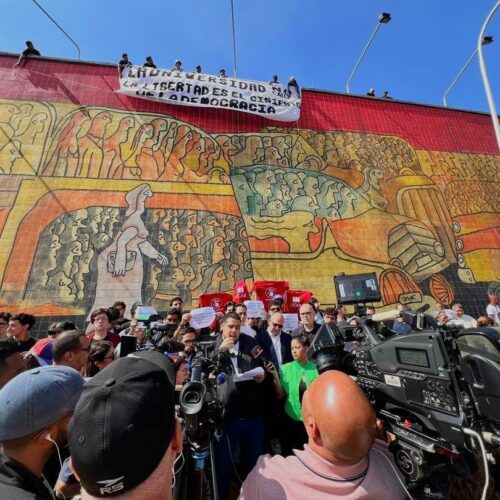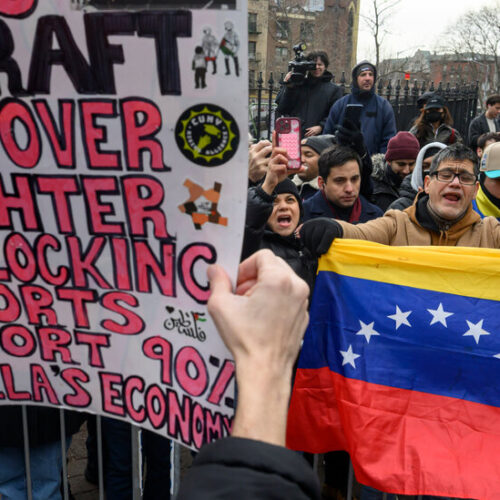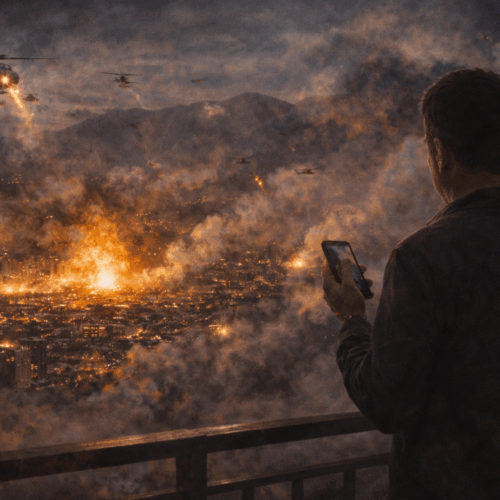Other voices: quality democracy?

If Venezuela is Athens, guess who Zeus is?
A rebuttal to my post on Venezuela being a democracy, from reader Jonathan Pfaehler…
————-
“Democracy is like beauty: you know it when you see it” – Anonymous.
A recent post on Caracas Chronicles asking “Is Venezuela a democracy?” provoked a healthy debate – with some rather predictable, combative, and contradictory responses. This probably happened because we shouldn’t just be quibbling over whether or not a country is a democracy – but on whether or not that country enjoys a certain minimum quality of democracy.
A quality democracy is one in which there is not only participation, representation, and (the always debatable point of) free and fair elections, but also a balance of power: a political system in which the executive branch does not legislate; a political system in which the judiciary is not a branch of the government (read: Chavernment) but a part of the state, and where the citizens have rights to be protected. As long as the law is democratic, justice is democratic.
Yet the point chavistas keep emphasizing is that all those things will fall into place, that the new division caused by Chávez was necessary to get away from the old division created long ago under the Punto Fijo pact signed in 1958. It is a question of legitimacy, they say: Chávez has now won four elections, and if the majority wanted him out, then they would have reacted so. It may not be the form of democracy that you like, but it’s the form that people want.
It is true, Latin American history (and perhaps world history) shows a deficit in citizenship for a particular kind of inhabitant: the poor, undereducated mestizo/mulato, perhaps female, who is not included by traditional political powers. For some, democracy is merely the inclusion of these people –a feat for which Chávez is lauded excessively by ardent followers who admire his dogged persistence in challenging the status quo.
To others, though, quality democracy contains another, not so subtle feature. As an Argentine professor once told me, “Democracy is the certainty that the noise outside your door at 3 a.m. is only the milkman.”
While it has been decades since the noise outside Venezuelans’ doors was made by military goons, there has been plenty of spilled milk. The obligation to stay in due to a high crime rate, the poor management of inflation, a national debt which has led to lack of options at Venezuelan markets, and autocensura are just a few examples of collateral damage in the search for “inclusion” in Venezuela. That nose you hear at 3 am may not be military goons, but it isn’t the ghost of Cleisthenes either.
We should still keep in mind that while the relatively new political majority of constituents in Venezuela may have benefited from Chávez’s policies in the last fourteen years, in no quality democracy does the majority benefit at the expense of the minority’s rights. Democracy is a system of minorities, because it is the only system that consistently guarantees equal rights to all citizens.
It seems, at this point, that even those who support Chávez are confusing rights with privileges.
The confusion of ideas may spring from the muddying of the term itself, which could be rooted in its inherent, and perhaps necessary, illusion. Democracy is a promise, which is never realized, but only sought after.
In Venezuela, that promise is a mockery, it’s a sham, and without that we don’t have a democracy. Just because we elect a government doesn’t mean it’s a democracy – these, my friends, are two distinct animals.
In a country in which the homicide rate is high enough to spike the neck hairs on the already dead, the executive has direct and unchecked use of FONDEN funds, and different rules are applied to opposition candidates/supporters, we might question what type of animal is upon us. It certainly isn’t one we have seen before.
Caracas Chronicles is 100% reader-supported.
We’ve been able to hang on for 22 years in one of the craziest media landscapes in the world. We’ve seen different media outlets in Venezuela (and abroad) closing shop, something we’re looking to avoid at all costs. Your collaboration goes a long way in helping us weather the storm.
Donate




